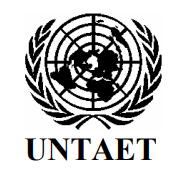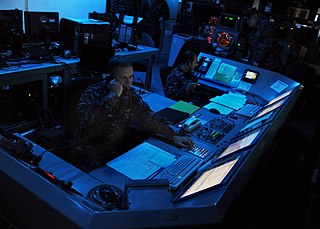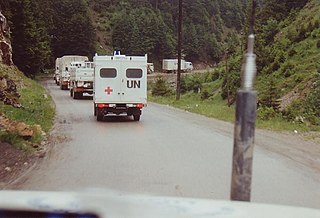
The United Nations (UN) is an intergovernmental organization whose stated purposes are to maintain international peace and security, develop friendly relations among nations, achieve international cooperation, and serve as a centre for harmonizing the actions of nations. It is the world's largest international organization. The UN is headquartered in New York City, and the UN has other offices in Geneva, Nairobi, Vienna, and The Hague, where the International Court of Justice is headquartered at the Peace Palace.
The United Nations Iraq–Kuwait Observation Mission (UNIKOM) was established on April 9, 1991 following the Gulf War by Security Council Resolution 689 (1991) and fully deployed by early May 1991.

The United Nations Transitional Administration in East Timor (UNTAET),, was a United Nations mission in East Timor that aimed to solve the decades long East Timorese crisis in the area occupied by Indonesian military. UNTAET provided an interim civil administration and a peacekeeping mission in the territory of East Timor, from its establishment on 25 October 1999, until its independence on 20 May 2002, following the outcome of the East Timor Special Autonomy Referendum. The transitional administration was established by United Nations Security Council Resolution 1272 in 1999.

Peacekeeping comprises activities, especially military ones, intended to create conditions that favor lasting peace. Research generally finds that peacekeeping reduces civilian and battlefield deaths, as well as reduces the risk of renewed warfare.
The United Nations has authorized 71 peacekeeping operations as of April 2018. These do not include interventions authorized by the UN like the Korean War and the Gulf War. The 1990s saw the most UN peacekeeping operations to date. Peacekeeping operations are overseen by the Department of Peacekeeping Operations (DPKO) and share some common characteristics, namely the inclusion of a military or police component, often with an authorization for use of force under Chapter VII of the Charter of the United Nations. Peacekeeping operations are distinct from special political missions (SPMs), which are overseen by the Department of Political Affairs (DPA). SPMs are not included in the table below.

Military operations other than war (MOOTW) are military operations that do not involve warfare, combat, or the threat or use of violence. They generally include peacekeeping, peacebuilding, disaster response, humanitarian aid, military engineering, law enforcement, arms control, deterrence, and multilateralism.

The United Nations Peacekeeping Force in Cyprus (UNFICYP) is a United Nations peacekeeping force that was established under United Nations Security Council Resolution 186 in 1964 to prevent a recurrence of fighting following intercommunal violence between the Greek Cypriots and Turkish Cypriots, to contribute to the maintenance and restoration of law and order and to facilitate a return to normal conditions. Major General Ingrid Gjerde is the current Force Commander of UNFICYP, appointed in 2021, and preceded by Cheryl Pearce (Australia). Assistant Police Commissioner Satu Koivu (Finland) is the current Senior Police Adviser appointed in 2021.

The United Nations Operation in the Congo was a United Nations peacekeeping force deployed in the Republic of the Congo in 1960 in response to the Congo Crisis. ONUC was the UN's first peacekeeping mission with significant military capabilities and remains one of the largest UN operations in size and scope.

The Operation Bøllebank is the name given to the military confrontation between Bosnian Serb military forces and Danish, Norwegian, and Swedish combat units composing the United Nations Protection Force's (UNPROFOR) Nordic Battalion, outside of the city of Tuzla on 29 April 1994.

The Department of Peace Operations (DPO) is a department of the United Nations charged with the planning, preparation, management and direction of UN peacekeeping operations. Previously known as the Department of Peacekeeping Operations (DPKO), it was created in March 1992, as part of a restructuring of the UN's peace and security apparatus. The DPO retains the core functions and responsibilities of its predecessor, with a greater emphasis on cohesion, integrating different resources and knowledge, and promoting human rights.
ONUCA was a United Nations peacekeeping mission deployed in Central America in 1990 and 1991.
The United Nations Peacekeeping efforts began in 1948. Its first activity was in the Middle East to observe and maintain the ceasefire during the 1948 Arab–Israeli War. Since then, United Nations peacekeepers have taken part in a total of 72 missions around the globe, 12 of which continue today. The peacekeeping force as a whole received the Nobel Peace Prize in 1988.

The Bangladesh Armed Forces and the Bangladesh Police have been actively involved in a number of United Nations Peace Support Operations (UNPSO) since 1988. Currently Bangladesh is the largest contributor in the UN peacekeeping missions.

The United Nations Mission in South Sudan (UNMISS) is a United Nations peacekeeping mission for South Sudan, which became independent on 9 July 2011. UNMISS was established on 8 July 2011 by United Nations Security Council Resolution 1996 (2011).

The United Nations Supervision Mission in Syria (UNSMIS) was a United Nations peacekeeping mission in Syria, set up in 2012 as a result of United Nations Security Council Resolution 2043 in response to the Syrian Civil War. It was commanded by Norwegian Major General Robert Mood until 20 July 2012 followed by Lieutenant General Babacar Gaye from Senegal. Although observers remain in the country, Mood suspended their mission on June 16, 2012 citing "escalating violence". Observers will conduct no further patrols and stay in their current positions until the suspension is lifted. On 20 July 2012, the Security Council extended UNSMIS for a final period of 30 days. According to resolution 2059, the Council would only consider more extensions in the event that the Secretary-General reports and the Security Council confirms the cessation of the use of heavy weapons and a reduction in the level of violence sufficient by all sides to allow UNSMIS to implement its mandate.
Mexico is one of the 51 founding members of the United Nations and was admitted into the organization in 1945. Since then, Mexico is a full member of all the UN agencies and participates actively within the organization and has diplomatic relations with most member states. In June 2020, Mexico was elected for its fifth two year Non-Permanent seat at the United Nations Security Council which begins on 1 January 2021.

The United Nations Multidimensional Integrated Stabilization Mission in Mali was a United Nations peacekeeping mission in Mali. MINUSMA was established on 25 April 2013 by United Nations Security Council Resolution 2100 to stabilise the country after the Tuareg rebellion of 2012, and was terminated over a decade later on 30 June 2023. Officially deployed on 1 July 2013, MINUSMA was the UN's second-most dangerous peacekeeping mission after Lebanon, with 304 peacekeepers killed out of a force of about 15,200 as of May 2023.
The Port Francqui incident, also known as the Port Francqui massacre, was an incident during the Congo Crisis where rogue Armed Forces of the Democratic Republic of the Congo (ANC) forces engaged in combat with UN peacekeepers, primarily from Ghana.








